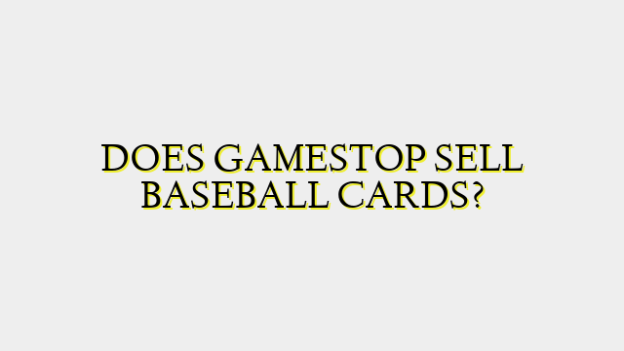GameStop has been one of the largest video game and gaming merchandise retailers for many years. While the bulk of their inventory and sales focus on video games, consoles, accessories and collectibles related directly to video games and gaming, GameStop has expanded their product offerings over the years to include some trading cards and collectibles beyond just gaming. This includes carrying a limited selection of sports trading cards, primarily focusing on baseball cards.
GameStop first started dipping their toes into the baseball card market around 2010 as card collecting saw a resurgence in popularity. They recognized an opportunity to tap into this adjacent collecting hobby that had some crossover appeal with their core gaming customers. Their initial baseball card offerings were fairly narrow, mostly consisting of just a few current year packs, boxes and sets from the major manufacturers like Topps and Panini. They kept the baseball card space small, usually just one or two short aisles in their stores dedicated to cards.
As baseball cards continued growing in popularity through the 2010s, GameStop slowly expanded their assortment. They added a few more back stocked years of sets and some higher endBoxes. Through market research they learned certain licensed and memorabilia cards were particularly appealing to collectors. So GameStop made sure to stock popular limited releases featuring star players from teams in their local markets. Areas with large Red Sox, Yankees or Cubs followings for instance would see dedicated shelving to those clubs.
By 2015, GameStop had significantly beefed up and fine tuned their baseball card offerings. Their buyers had a keener understanding of the trends and what was moving off shelves. GameStop relocated and expanded card spaces in many high volume stores. In addition to being the only retailer carrying game used memorabilia boxes, they also gained exclusives on blaster and hanger packs certain years before wider distribution. This gave serious collectors incentive to check their local GameStop first for hot new products.
Though still a very small percentage of overall sales, baseball cards had become an important second category that added millions in revenue annually for GameStop across thousands of U.S. locations. Through the promotion of new releases and building community amongst regular hobby shoppers, GameStop baseball became a destination in its own right. Kids dreaming of pulling rare rookie gems flocked to GameStop with allowances and birthday money same as any local card shop.
One key advantage GameStop had in the still specialized baseball card market was reliable supply of the most in demand products. As the largest multi-billion dollar gaming company, they wielded huge purchasing power to secure ample shipments direct from manufacturers. This provided a level of stability retailers like local hobby shops struggled to match, giving GameStop a competitive edge. Even during the peak pandemic buying frenzies of 2020, GameStop always had stock on shelves when others sold out, gaining them even more customer goodwill.
By 2022, GameStop had developed one of the strongest and most diverse baseball card inventories of any national retailer. In addition to carrying the annual flagship Topps, Panini, Bowman and Topps Chrome sets plus all high-end box breakdowns, they also stocked retro and vintage reprints along with international releases. GameStop used data insights about what moved best where, so stores specifically catered breakers and types of products appealing to local fanbases. Urban locations devoted more space to licensed memorabilia cards while suburbs focused on affordable kids products.
With such a robust selection matched by knowledgeable specialist staff, GameStop had solidified its place as a serious competitor alongside LCS for today’s booming baseball card market. Their pricing, availability and breadth of product maches any local shop, while providing an extra level of convenience being located in most shopping areas nationwide. GameStop succeeded in tapping into baseball cards where other mass retailers fell short through deep dedication to understanding collectors and what they truly wanted on shelves. This allowed both new and seasoned hobbyists nationwide to reliably find exactly what they sought amongst the glow of game consoles at their local GameStop.
Yes GameStop does sell baseball cards today across its United States stores. Over the past decade they have strategically expanded from a niche assortment into having one of the strongest and most diverse trading card inventories in the industry, contending directly with local card shops. Through dedicated market research, securing scarce products, and community building support, GameStop has made its stores as indispensable a destination for today’s baseball card collector as any local hobby shop. Their national footprint and category-leading sourcing bandwidth position them perfectly to excel as a multi-billion dollar player in the sport card space for years ahead.

